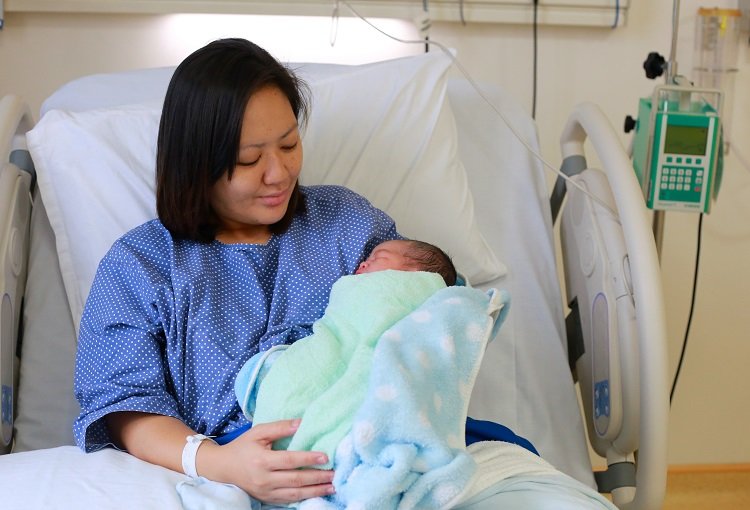Why Is Postpartum Care Vital for New Mothers?
Proper postpartum care is essential for you as it aids in your physical and emotional recovery after giving birth. Nutritious meals and gentle exercises like walking or yoga promote healing and boost your energy. Strengthening core muscles with exercises like Kegels supports your body. Seeking guidance from healthcare providers can aid in a faster recovery process. Additionally, focusing on your emotional well-being and seeking community support help in managing challenges. Remember, prioritizing postpartum care sets the foundation for your overall health and well-being as you begin this new journey of motherhood.
Key Takeaways
- Supports physical and emotional recovery.
- Aids in healing and replenishing nutrients.
- Prevents postpartum complications.
- Enhances mother-baby bonding.
- Provides long-term health benefits.
Importance of Postpartum Care

Ensuring proper postpartum care is essential for new mothers to recover physically and emotionally after giving birth. Postpartum nutrition plays a vital role in replenishing the body with essential nutrients and supporting overall well-being. Consuming a balanced diet rich in fruits, vegetables, lean proteins, and whole grains can aid in the healing process and provide energy needed for caring for a newborn.
Incorporating exercise into your postpartum routine can also be advantageous. Gentle activities like walking, yoga, or low-impact aerobics can help strengthen muscles, improve mood, and boost energy levels.
It’s important to start slowly and listen to your body, gradually increasing the intensity and duration of workouts as you regain strength.
Physical Recovery After Birth

Proper physical recovery after giving birth is essential for new mothers to regain strength and support overall well-being. Postpartum exercises play an important role in helping your body recover from the changes it underwent during pregnancy and childbirth. These exercises, such as Kegels, pelvic tilts, and gentle abdominal contractions, can aid in strengthening your core muscles, promoting healing, and improving posture.
Starting with light activities and gradually increasing intensity over time can help prevent injuries and support a smoother recovery process. The recovery timeline varies for each woman, but generally, it takes about six weeks for the body to heal internally. However, it’s important to listen to your body and not rush the process.
Engaging in postpartum exercises, under the guidance of healthcare providers, can assist in a faster recovery. Remember, everyone’s journey is unique, so be patient and kind to yourself as you navigate this phase of physical recovery after childbirth.
Emotional Well-being for New Moms

Taking care of your emotional well-being is just as important as focusing on your physical recovery after giving birth. The postpartum period can bring about a range of emotions, from joy and excitement to feelings of anxiety and overwhelm. It’s essential to prioritize your mental health during this time.
Community support plays a significant role in helping new moms navigate the emotional challenges that can arise postpartum. Connecting with other mothers who are going through similar experiences can provide a sense of belonging and understanding. Consider joining local mom groups, seeking online forums, or attending support groups to build a network of individuals who can offer guidance and empathy.
In addition to seeking community support, implementing self-care strategies is crucial for maintaining emotional well-being. Taking time for yourself, practicing mindfulness or meditation, ensuring you get enough rest, and engaging in activities you enjoy can all contribute to a positive mindset.
Impact on Mother-Baby Bonding
Establishing a strong bond with your baby is crucial as a new mother, and addressing any challenges early on is vital to nurturing a close connection.
Emotional support plays a significant role in enhancing mother-baby bonding, so don’t hesitate to seek help from loved ones or healthcare professionals if needed.
Bonding Challenges Addressed
Addressing bonding challenges during the postpartum period is essential for fostering a strong connection between you and your baby. Communication strategies play a vital role in overcoming these challenges. It’s important to communicate openly with your partner about your feelings, concerns, and needs.
Setting aside dedicated time for bonding activities, such as skin-to-skin contact or baby massage, can help strengthen the mother-baby bond. Effective time management is key in ensuring you have quality moments with your little one amidst daily tasks.
Additionally, practicing self-care tips and stress management techniques can greatly impact your ability to bond with your baby. Remember to prioritize your well-being by getting enough rest, eating nutritious meals, and seeking support when needed. Managing stress through relaxation techniques like deep breathing or mindfulness can create a calm environment that fosters bonding.
Emotional Support Importance
Supporting new mothers emotionally is essential for fostering a strong bond between you and your baby during the postpartum period. The emotional support you receive plays a vital role in nurturing a positive mother-baby relationship.
Peer support groups can offer a sense of community, understanding, and validation, helping you navigate the challenges of motherhood. Connecting with other mothers who may share similar experiences can reduce feelings of isolation and provide a supportive network.
Counseling services are another valuable resource that can assist you in processing your emotions, addressing any concerns, and developing coping strategies. Professional counselors can offer a safe space for you to explore your feelings, work through any difficulties, and strengthen your mental well-being.
Role in Preventing Postpartum Complications

Play an essential role in safeguarding your health and well-being by actively engaging in preventive measures to reduce the risk of postpartum complications. As a new mother, prioritizing postpartum care is important for a smooth recovery and overall wellness. Preventing complications during this delicate period involves various strategies.
Firstly, attending postpartum check-ups is important. These appointments allow healthcare providers to monitor your physical and emotional well-being, detect any potential issues early on, and provide necessary interventions.
Following recommended postpartum care guidelines, such as proper wound care for cesarean sections or episiotomies, can greatly reduce the risk of infections and other complications.
Additionally, maintaining a nutritious diet and staying hydrated are essential for a good recovery. Adequate rest and seeking help when needed also play a significant role in preventing postpartum complications.
Support for Breastfeeding Success
To guarantee a successful breastfeeding journey, it’s important to seek adequate support and guidance during the postpartum period. Breastfeeding can present various challenges, such as latching difficulties, low milk supply, or nipple pain. Seeking help from a lactation consultant or a healthcare provider can make a significant difference in overcoming these obstacles.
Lactation support is vital in providing evidence-based strategies to improve breastfeeding techniques and address any concerns that may arise. Lactation consultants are trained professionals who can offer personalized assistance to make sure that you and your baby have a positive breastfeeding experience. They can provide guidance on proper positioning, effective latching techniques, and strategies to boost milk production.
Additionally, they can offer solutions for common issues like engorgement or mastitis.
Addressing Mental Health Challenges

You may be experiencing a range of emotions after giving birth, and it’s important to address your mental health during this time.
Regular mental health check-ins and support systems can greatly benefit new mothers in managing this period of adjustment.
Mental Health Check-Ins
Regular mental health check-ins are essential for new mothers to address any challenges they may be facing postpartum. It’s vital to prioritize your mental well-being during this transformative time.
Peer support can be incredibly beneficial, as sharing experiences with other new moms can provide comfort and validation. Knowing that you’re not alone in your feelings can make a world of difference.
Additionally, therapy options are available to help you navigate any mental health challenges you may encounter. Speaking with a therapist can offer a safe space to explore your emotions, develop coping strategies, and work through any difficulties you may be experiencing.
Support for Moms
Seeking professional help is essential in addressing mental health challenges faced by new moms during the postpartum period. In addition to therapy and medication, peer support plays a vital role in helping mothers navigate their emotions. Connecting with other moms who’ve experienced similar struggles can provide a sense of belonging and understanding that’s invaluable. Peer support groups offer a safe space for sharing feelings, fears, and triumphs, fostering a supportive community.
Moreover, online resources can be a lifeline for mothers who may find it challenging to attend in-person meetings. Websites, forums, and social media groups dedicated to postpartum mental health allow moms to seek advice, share experiences, and access valuable information from the comfort of their homes. These platforms provide a sense of anonymity while still fostering connections and support.
Long-term Benefits for Mom’s Health

Long-term benefits await mothers who prioritize their postpartum health, ensuring a strong foundation for overall well-being in the years to come. Nutritional guidance plays an essential role in helping new mothers recover and maintain excellent health post-birth. Adequate nutrient intake, especially foods rich in iron, calcium, and vitamins, can aid in replenishing stores depleted during pregnancy and childbirth, supporting energy levels and overall wellness.
Exercise recommendations tailored to the postpartum period can also yield significant long-term advantages for mothers. Engaging in appropriate physical activity not only assists in regaining strength and stamina but can also contribute to weight management, improved cardiovascular health, and enhanced mental well-being. Activities like walking, postpartum yoga, or gentle aerobics can be beneficial, gradually progressing as your body heals.
Frequently Asked Questions
How Can Partners Actively Support Postpartum Care?
Support your partner by actively engaging in postpartum care. Show emotional support through listening and validating feelings. Communicate openly about needs and concerns. Provide practical help with household tasks and caring for the baby to lessen the load.
What Exercises Are Safe During Postpartum Recovery?
During postpartum recovery, focus on gentle exercises like walking and pelvic floor exercises to aid in healing. Pair this with proper nutrition tips for best recovery. Remember, these activities support your body’s journey after childbirth.
Are There Specific Ways to Enhance Mother-Baby Bonding?
To enhance mother-baby bonding, try baby massage and skin-to-skin contact. These activities release bonding hormones, promote relaxation, and deepen your connection with your little one. They can also help with your newborn’s development and well-being.
Can Postpartum Care Prevent Future Pregnancies’ Complications?
To prevent future pregnancy complications, postpartum care is essential. Postpartum nutrition and postpartum checkups can help monitor your health, address any issues early, and provide support for a healthy recovery, reducing risks for future pregnancies.
What Resources Help New Moms With Mental Health Struggles?
You can find valuable help for mental health struggles after childbirth. Therapy options offer personalized guidance to navigate emotions. Support groups provide a safe space to connect with others who understand and offer encouragement.
Conclusion
In summary, postpartum care is essential for new mothers to recover physically, emotionally, and mentally after giving birth. This care plays a vital role in preventing complications, supporting breastfeeding, and fostering a strong bond between mother and baby.
By prioritizing postpartum care, you aren’t only taking care of yourself but also setting the foundation for long-term health and well-being for both you and your baby. Remember, you deserve the support and care during this important time.

Chad Adan Kace, a young dad from Vermont, shares his parenting journey with a touch of humor and lots of love. Father to a lively baby, he explores the joys and challenges of fatherhood through his stories.


